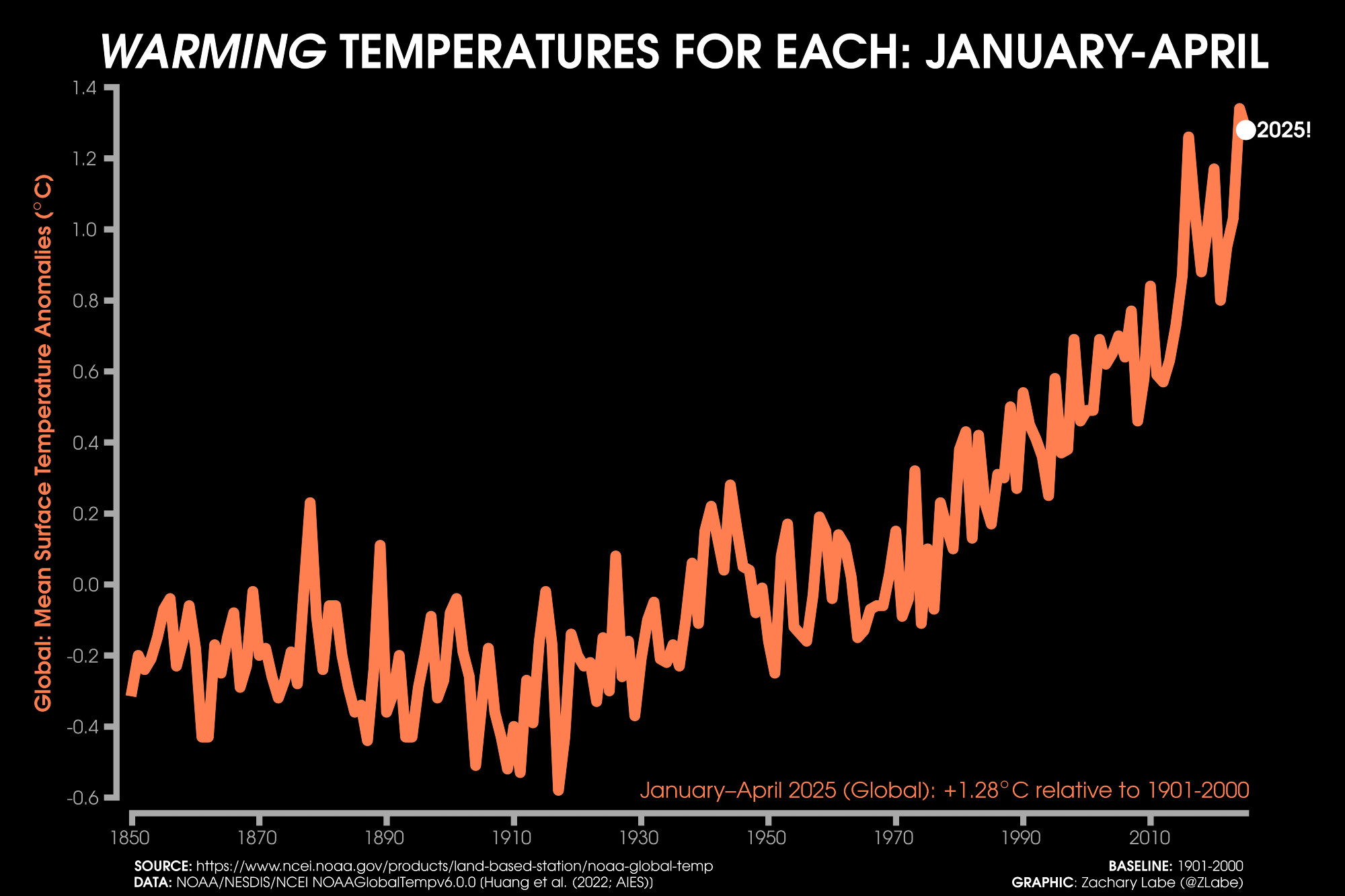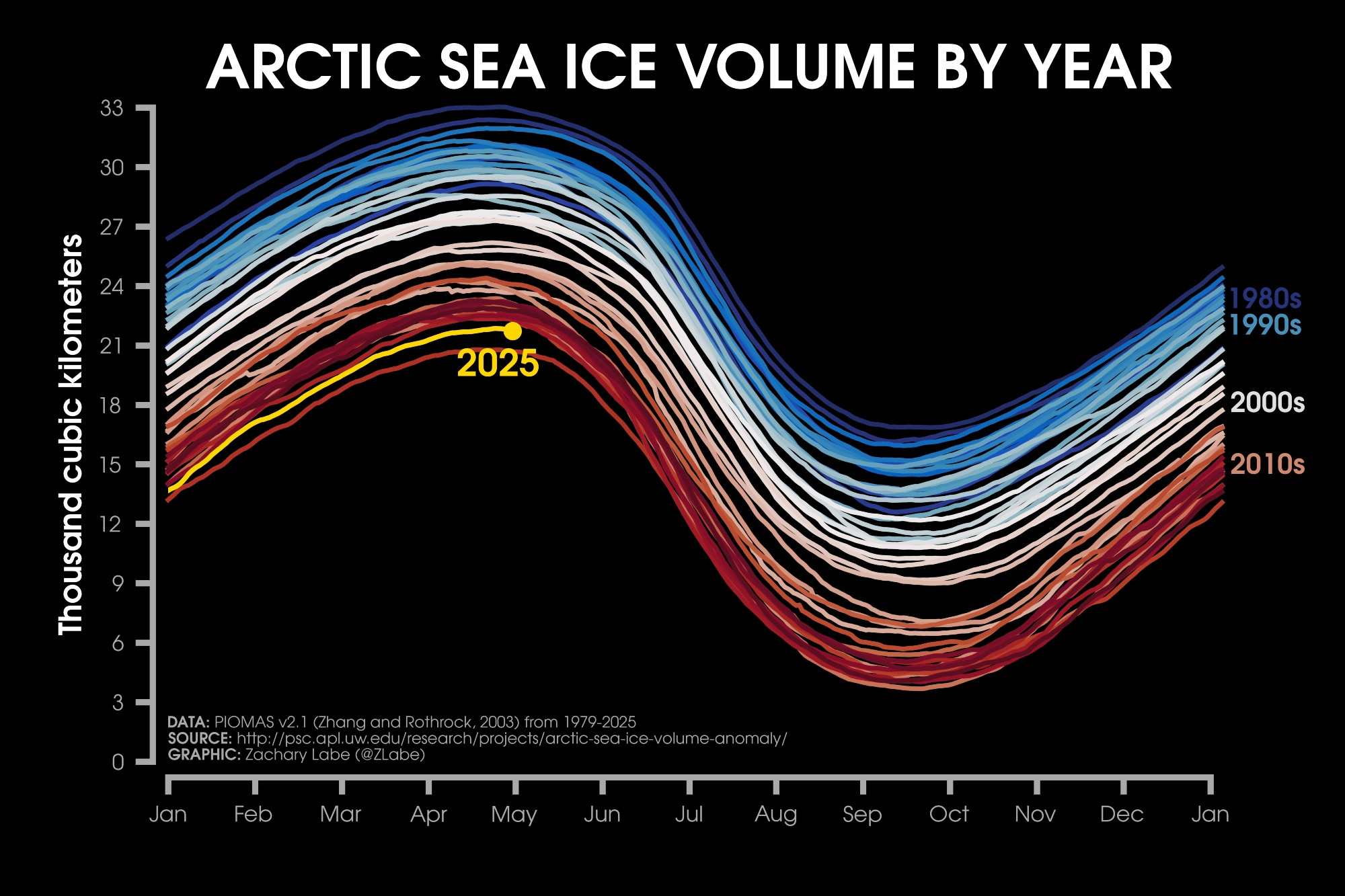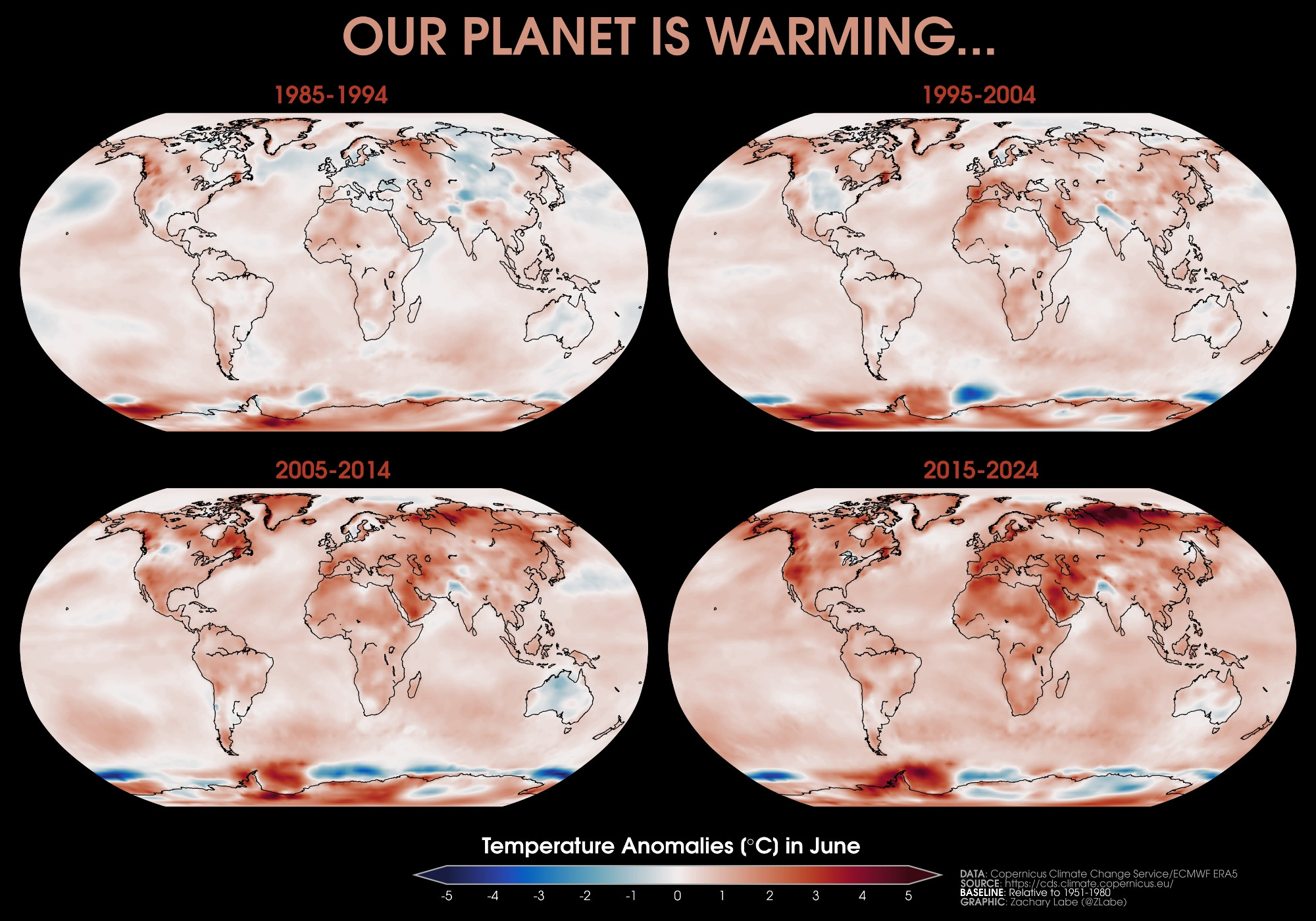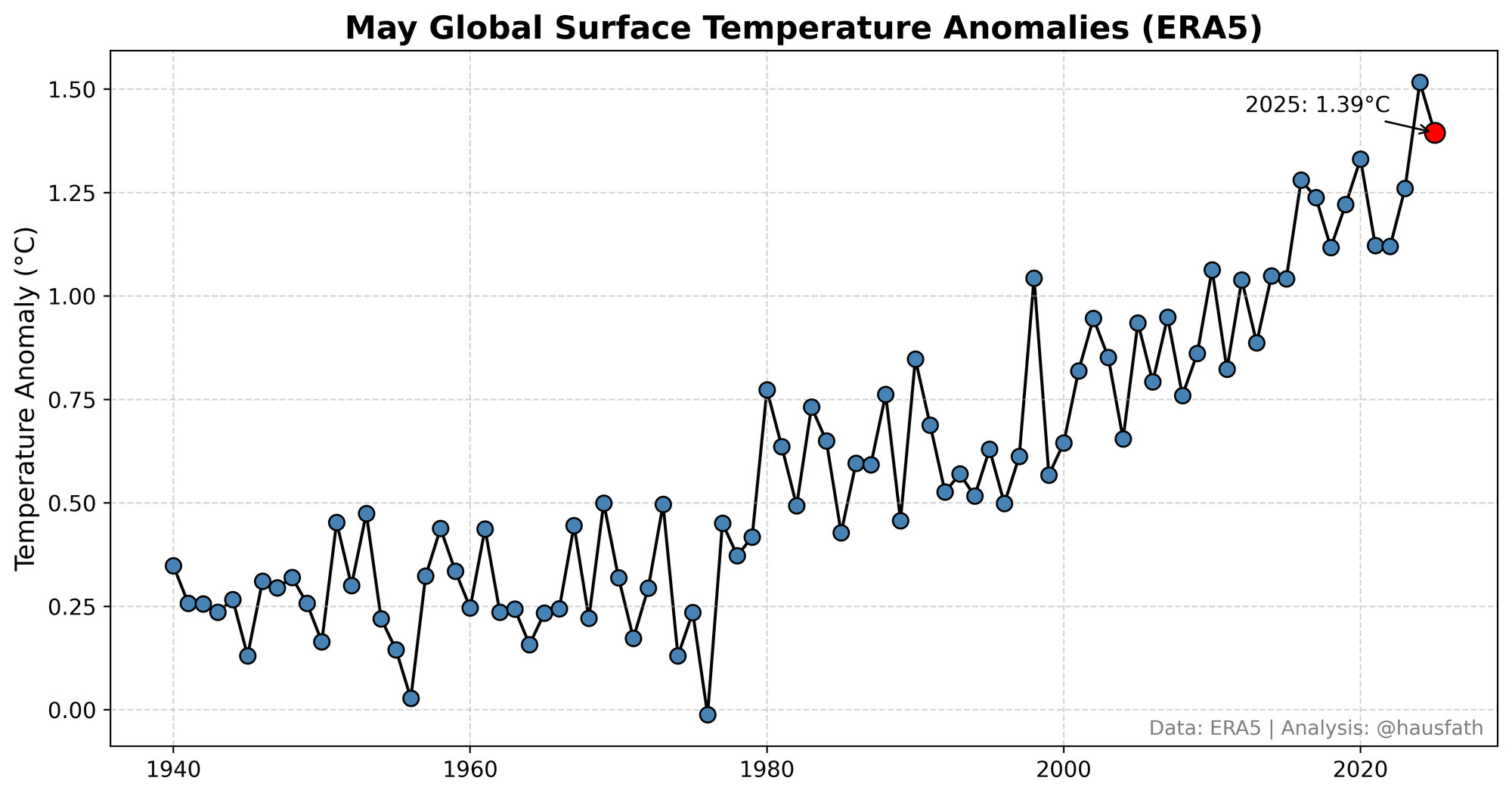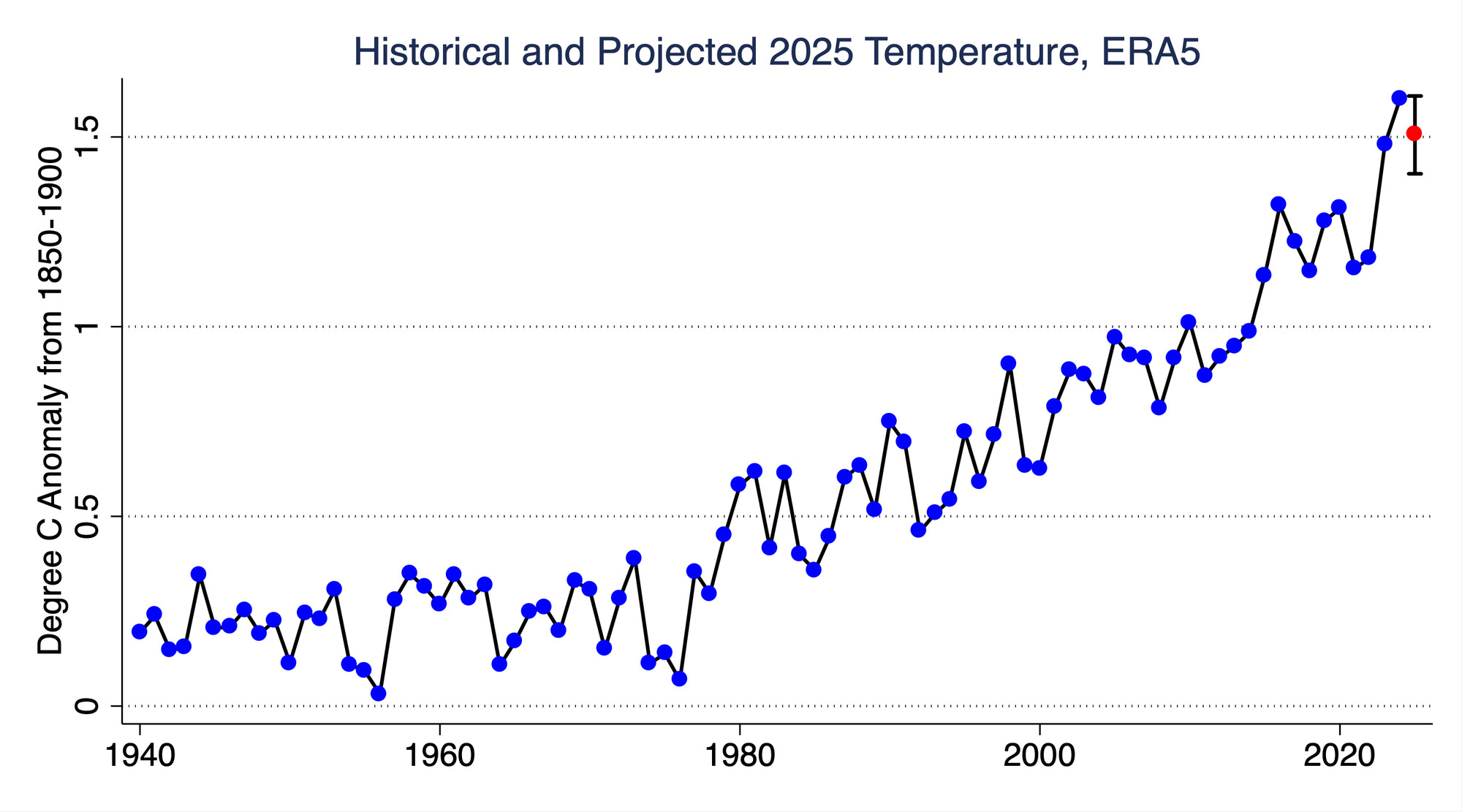^
that's 200% spot on Norton.
Results 6,876 to 6,893 of 6893
Thread: Any doubts about Climate Change?
-
17-05-2025, 05:49 PM #6876
-
18-05-2025, 05:49 PM #6877last farang standing
































- Join Date
- May 2015
- Last Online
- 08-06-2025 @ 04:00 PM
- Location
- Qld/Bangkok
- Posts
- 4,196
I've been concerned for quite a while that my Huawei solar inverter has been hacked by the Chinese government and it is leaking top secret information as to my power usage. Luckily my tinfoil hat was big enough to fit over the inverter.
-
18-05-2025, 07:46 PM #6878
-
19-05-2025, 06:04 AM #6879
-
23-05-2025, 06:30 AM #6880
2025 close behind 2024 as the hottest start to a year
Global temperatures in the first quarter of 2025 were the second warmest on record, extending a remarkable run of exceptional warmth that began in July 2023.
This is despite weak La Niña conditions during the first two months of the year – which typically result in cooler temperatures.
With temperature data for the first three months of the year now available, Carbon Brief finds that 2025 is very likely to be one of the three warmest years on record.
However, it currently remains unlikely that temperatures in 2025 will set a new annual record.
In addition to near-record warmth, the start of 2025 has seen record-low sea ice cover in the Arctic between January and March – and the second-lowest minimum sea ice extent on record for Antarctica.
Second-warmest start to the year
In this quarterly state of the climate assessment, Carbon Brief analyses records from five different research groups that report global surface temperature records: NASA, NOAA, Met Office Hadley Centre/UEA, Berkeley Earth and Copernicus/ECMWF.
The figure below shows the annual temperatures from each of these groups since 1970, along with the average over the first three months of 2025.
(It is worth noting that the first three months may not be representative of the year as a whole, as greater historical warming rates mean that temperatures relative to pre-industrial levels tend to be larger in the northern hemispheric winter months of December, January and February.)
 Keep your friends close and your enemies closer.
Keep your friends close and your enemies closer.
-
23-05-2025, 09:32 AM #6881
Global wheat yields would be ‘10%’ higher without climate change
Global yields of wheat are around 10% lower now than they would have been without the influence of climate change, according to a new study.
The research, published in the Proceedings of the National Academy of Sciences, looks at data on climate change and growing conditions for wheat and other major crops around the world over the past 50 years.
It comes as heat and drought have this year been putting wheat supplies at risk in key grain-producing regions, including parts of Europe, China and Russia.
The study finds that increasingly hot and dry conditions negatively impacted yields of three of the five key crops examined.
Overall, global grain yields soared during the study period due to technological advancements, improved seeds and access to synthetic fertilisers.
But these yield setbacks have “important ramifications for prices and food security”, the study authors write.
-
26-05-2025, 06:21 AM #6882
NASA April 2025 was the 2nd warmest April recorded

NASA
-
26-05-2025, 09:59 AM #6883
Zack Labe
The global mean surface air temperature anomaly (departure from average) so far this year... Data from NOAAGlobalTemp v6.0.0 averaged over January to April since 1850 and available from www.ncei.noaa.gov/products/lan...
@zacklabe.com on Bluesky
-
29-05-2025, 06:03 AM #6884
JMA April 2025 was the 2nd warmest April recorded

Japan Meteorological Agency
__________
Zack Labe @zacklabe.com
Each line represents one year of #Arctic sea ice volume from 1979 [dark blue] to 2024 [dark red]. This year is shown in yellow - now updated through April 2025: @zacklabe.com on Bluesky
-
29-05-2025, 11:07 AM #6885
Zeke Hausfather @hausfath.bsky.social
We often hear folks skeptical of climate change claim that "the climate is always changing" or "temperatures rise before CO2" or "its the sun". In a new episode of PBS's Weathered, @leafwax.bsky.social and I try and address these questions: @hausfath.bsky.social on Bluesky
Did Climate Skeptics Get THIS Right?!
-
29-05-2025, 01:56 PM #6886
Global climate predictions show temperatures expected to remain at or near record levels in coming five years
Professor Stephen Belcher is the Met Office chief scientist. Commenting on todayÂ’s report, he said: The latest planetary health check tells us that earth is profoundly ill. Many of the vital signs are sounding alarms.
WMO Global Annual to Decadal Climate Update (2025-2029)
Key messages
- 80% chance that at least one of the next five years will exceed 2024 as the warmest on record
- 86% chance that at least one of next five years will be more than 1.5°C above the 1850-1900 average
- 70% chance that 5-year average warming for 2025-2029 will be more than 1.5 °C
- Long-term warming (averaged over decades) remains below 1.5°C
- Arctic warming predicted to continue to outstrip global average
- Precipitation patterns have big regional variations
The WMO Global Annual to Decadal Climate Update (2025–2029) projects that global temperatures are expected to continue at or near record levels in the next five years, increasing climate risks and impacts on societies, economies and sustainable development.
The report forecasts that the annually averaged global mean near-surface temperature for each year between 2025 and 2029 is predicted to be between 1.2°C and 1.9°C higher than the average over the years 1850-1900. There is an 80% chance that at least one year between 2025 and 2029 will be warmer than the warmest year on record (currently 2024). And there is an 86% chance that at least one year will be more than 1.5°C above the pre-industrial level. The report does not give global predictions for individual years.
There is a forecast 70% chance that the five-year average warming for 2025-2029 will be more than 1.5°C, according to the report. This is up from 47% in last year’s report (for the 2024-2028 period) and up from 32% in the 2023 report for the 2023-2027 period. Every additional fraction of a degree of warming drives more harmful heatwaves, extreme rainfall events, intense droughts, melting of ice sheets, sea ice, and glaciers, heating of the ocean, and rising sea levels.
WMO Global Annual to Decadal Climate Update (2025-2029)
-
30-05-2025, 06:46 AM #6887
World faces new danger of ‘economic denial’ in climate fight, Cop30 head says
The world is facing a new form of climate denial – not the dismissal of climate science, but a concerted attack on the idea that the economy can be reorganised to fight the crisis, the president of global climate talks has warned.
André Corrêa do Lago, the veteran Brazilian diplomat who will direct this year’s UN summit, Cop30, believes his biggest job will be to counter the attempt from some vested interests to prevent climate policies aimed at shifting the global economy to a low-carbon footing.
“There is a new kind of opposition to climate action. We are facing a discredit of climate policies. I don’t think we are facing climate denial,” he said, referring to the increasingly desperate attempts to pretend there is no consensus on climate science that have plagued climate action for the past 30 years. “It’s not a scientific denial, it’s an economic denial.”
This economic denial could be just as dangerous and cause as much delay as repeated attempts to deny climate science in previous years, he warned in an exclusive interview with the Guardian.
As the climate crisis has gathered pace, temperatures have risen and the effects of extreme weather have become more obvious, scientists have been able to draw ever more clearly the links between greenhouse gas emissions and our impacts on the planet. So the argument has shifted, Corrêa do Lago believes, from undermining or misrepresenting the science to attempts to counter climate policy.
“It is not possible to have [scientific] denialism at this stage, after everything that has happened in recent years. So there is a migration from scientific denial to a denial that economic measures against climate change can be good for the economy and for people.”
The rise of populist politicians around the world has fuelled a backlash against climate policy, most clearly seen in the presidency of Donald Trump in the US, where he has set about cancelling policies intended to boost renewable energy and cut greenhouse gases, and dismantling all forms of government-sponsored climate-related institutions, including scientific research labs.
Corrêa do Lago wants to spur a new global effort to persuade people that remodelling the economy away from a reliance on fossil fuels and towards a clean energy future will reap benefits for all people. “The new populism is trying to show [that tackling the climate crisis does not work],” he said. “It’s the turn of those who believe in the fight against climate change to show and to prove that fighting climate change is possible, and that it can come with economic advantages and with a better quality of life.”
Corrêa do Lago is an economist by training – the youngest of five brothers, all of whom became economists. “My mother was horrified with our lack of originality,” he joked.
He has been a career diplomat, having joined Brazil’s foreign service in 1983 and serving previously as ambassador to India and Japan. He is also a veteran of the Cop talks – the annual “conference of the parties”, which will take place this year in Belém, near the mouth of the Amazon, in November.
“Most of the answers have to come from the economy,” said Corrêa do Lago. “Because we have now enough science, enough demonstration of how climate change can affect people’s lives. Now we need answers [in the form of policy measures]. We need economists to rally.”
Over the past two decades, economists have begun to take on the challenge of the climate crisis, after the 2006 landmark review by Nicholas Stern, the former chief economist of the World Bank, which found it would be cheaper to tackle emissions than to allow them to run unchecked. That contradicted the conclusions of some previous economists, who had claimed it was not worth trying to move away from fossil fuels, or it would be too expensive.
Since then, multiple reports have proved the same point. Most recently, the Organisation for Economic Co-operation and Development (OECD) and the UN Development Programme produced a joint report this year, with the final version to come out next month, showing that tackling the climate crisis would materially increase economic growth, rather than being a necessary cost.
But much mainstream thinking on economics does not take the climate crisis into account. Most governments preparing budgets, for instance, do not include climate impacts in their estimates, and nor do businesses. Many of the economic estimates of climate damage are also far too modest. For Corrêa do Lago, this shows that much more needs to be done.
“Climate has not been incorporated into economic theory in a satisfactory way yet,” he said. “Because it’s a very disturbing element.”
Corrêa do Lago also faces the task of corralling 196 nations into producing new national plans on greenhouse gas emissions within the next few months, and meanwhile Brazil is already wrestling with the logistical challenges of holding Cop30 in a rainforest. There was controversy earlier this year over a road being built through the forest to the city, though Brazilian officials said the road had already been planned before Cop30 was awarded to Belém. There are also concerns about the environmental credentials of the Brazilian president as his government continues to approve mines and oil drilling projects.
But those pale in comparison with geopolitical headwinds. Trump will not attend the talks and has withdrawn from the Paris agreement, and his actions have emboldened countries that wish to derail progress. Saudi Arabia, Russia, Argentina, Venezuela and a host of other countries, including petrostates and populist-leaning governments, are all possible mischief-makers. Other major economies may be less overtly disruptive but also could fall well short in their commitments, with equally damaging effects.
Each country is supposed to prepare a nationally determined contribution (NDC), a complex document setting out targets on greenhouse gas emissions to 2035 and sometimes beyond, and policies intended to meet them. But so far only a handful of countries – not including the EU, China, Japan or India – have submitted their NDCs, even though the deadline passed in February.
The UK’s plan was submitted last year, along with Brazil’s.
Brazil and last year’s hosts, Azerbaijan, are working on a “roadmap” that will set out what countries must do to achieve the financial goals that will also be a key issue. The outline will be ready before governments gather in the Amazon in November.
For Corrêa do Lago, the hope is that the world can come together to solve the existential crisis of the climate in the way governments did 40 years ago to tackle the hole in the ozone layer. “Climate change is much more complex, and the gases act for much longer, and the impact on the economy is infinitely larger than the elimination of the gases that deplete the ozone layer. But the ozone layer is the only example of the phenomenon that connected human action could change the direction [of an environmental crisis].”
If we fail? “The alternative is accelerating climate change.”
-
04-06-2025, 06:25 AM #6888
Zack Labe @zacklabe.com
It's already June! Here's a look at how temperatures have changed globally over the last four decades during this month... Data from @copernicusecmwf.bsky.social ERA5 (doi.org/10.24381/cds...). @zacklabe.com on Bluesky
-
04-06-2025, 11:18 AM #6889
4 billion people endured extra month of extreme heat due to climate change, experts say
Scientists say 4 billion people, about half the world’s population, experienced at least one extra month of extreme heat because of human-caused climate change from May 2024 to May 2025.
The extreme heat caused illness, death, crop losses, and strained energy and health care systems, according to the analysis from World Weather Attribution, Climate Central and the Red Cross.
“Although floods and cyclones often dominate headlines, heat is arguably the deadliest extreme event,” the report said. Many heat-related deaths are unreported or are mislabeled by other conditions like heart disease or kidney failure.
The scientists used peer-reviewed methods to study how much climate change boosted temperatures in an extreme heat event and calculated how much more likely its occurrence was because of climate change. In almost all countries in the world, the number of extreme heat days has at least doubled compared with a world without climate change.
Snip
But without phasing out fossil fuels, heat waves will continue becoming more severe and frequent and protective measures against the heat will lose their effectiveness, the scientists said.
-
04-06-2025, 12:37 PM #6890
Antarctic Ice Sheet tipping in the last 800,000 years warns of future ice loss
A new study warns that the world has “likely” already reached a tipping point in the West Antarctic ice sheet. The authors model the response of the Antarctic Ice Sheets to “glacial-interglacial warming and cooling cycles” over the last 800,000 years. They find that a collapse of the West Antarctic ice sheet would result in 4 metres of sea level rise, with “little (0.25C) or even no ocean warming above present”. This finding supports recent studies which warn of “substantial irreversible ice loss with little or no further climate warming”, the authors say.
-
04-06-2025, 02:20 PM #6891
Earth eyes 2C
TEMPERATURE WARMING: Global temperatures could hit nearly 2C above pre-industrial levels for the first time in the next five years, according to new data from the UN World Meteorological Organization (WMO) covered by the Financial Times. The outlet noted that this would not represent a breach of the Paris Agreement target of keeping warming below 2C, as this threshold is typically measured over at least two decades. However, it added that 2C of warming would result in a “fall in crop yields” and more than a third of the world’s population being exposed to extreme heat.
-
Yesterday, 10:40 AM #6892
Copernicus: May 2025 was the 2nd warmest May recorded

Copernicus
-
Yesterday, 01:58 PM #6893
Zeke Hausfather @hausfath.bsky.social
May 2025 was the second warmest May on record after 2024, at around 1.4C above preindustrial levels in the ERA5 dataset. NH summer months generally show a bit less warming since preindustrial, as the world has warmed faster in winter months.: @hausfath.bsky.social on Bluesky
Zeke Hausfather @hausfath.bsky.social
With five months now in, its looking increasingly likely 2025 will end up as the second warmest on record. It could still end up as the third warmest after 2024 and 2023, but it's virtually certain to be a top-three year.
Thread Information
Users Browsing this Thread
There are currently 1 users browsing this thread. (0 members and 1 guests)




 Reply With Quote
Reply With Quote




